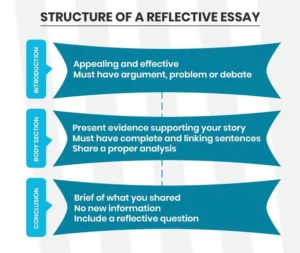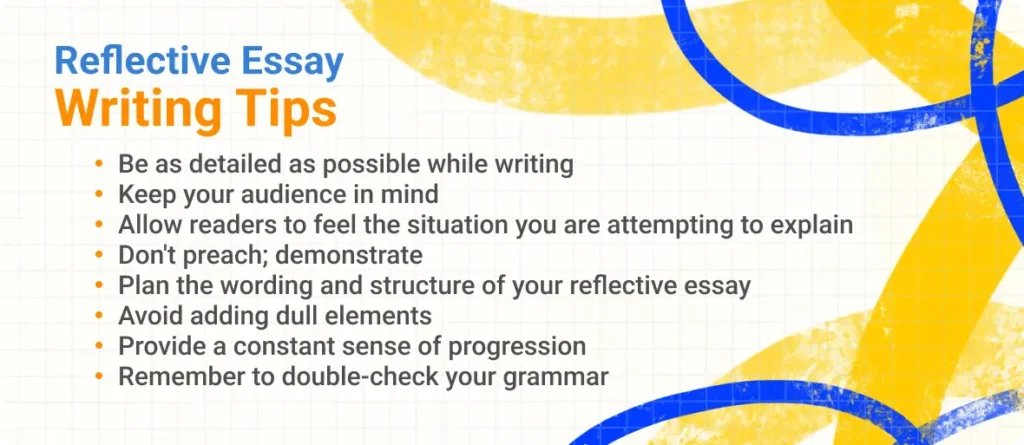Imagine a world where your thoughts take shape, your experiences find meaning, and your insights shine like stars in the night sky—all within a carefully structured narrative. This is the realm of reflective essays, where the ordinary transforms into the extraordinary. Reflective essays are more than just words on a page; they are the mirrors of your soul. They invite you to express your innermost thoughts and emotions, revisit your life’s journey, and reflect upon the moments that have shaped you.
In this enchanting guide, we are your companions on a journey into the heart of reflective essays. We’re here to unravel the mysteries, explore the depths, and reveal the brilliance of this captivating form of writing.
What are Reflective Essays?

Reflective essays, a distinct form of academic writing, hold profound significance as they enable individuals to articulate their thoughts, experiences, and insights in a structured manner. These essays transcend the boundaries of mere storytelling, serving as windows into the inner world of the author’s mind. They encourage introspection, prompting individuals to not only recount events but also delve into the “why” and “what” behind those experiences. In doing so, reflective essays become a powerful tool for personal growth and self-discovery, allowing authors to communicate their unique perspectives with coherence and engagement.
Within the framework of reflective essays, individuals take on dual roles, that of writers and philosophers, weaving narratives that encapsulate their inner journeys. These essays become more than words on paper; they are a testament to the art of introspection and offer a medium for sharing shared human experiences. Whether utilized in academic contexts or as a means to convey life’s lessons, reflective essays offer a platform where thoughts find eloquent expression, memories are preserved, and wisdom is shared. They stand as an opportunity for individuals to inspire, inform, and transform through the art of thoughtful reflection and well-structured narratives.
Reflective Essays: A Dive into Self-Exploration and Expression
Reflective essays represent a unique genre of writing, characterized by their distinct focus on encouraging individuals to delve deep within themselves, analyze their experiences, and effectively communicate their personal thoughts, emotions, and observations. Often integrated into academic coursework, these essays serve as a valuable platform for students to embark on journeys of self-reflection, charting their personal growth trajectories and reflecting upon the myriad experiences that shape their lives.
The Essence of Reflective Essays
Reflective essays extend far beyond the confines of mere storytelling. They transcend the superficial layers of recounting events and require authors to engage in profound contemplation and critical thinking. These essays act as a canvas upon which writers can paint the intricate tapestries of their thoughts, feelings, and actions, offering readers an intimate glimpse into their experiences and their unique perspectives on the world.

Key Characteristics of Reflective Essays
Personal Perspective:
At the core of reflective essays lies their inherently personal nature. Authors are tasked with the responsibility of opening the doors to their inner worlds, sharing not only the events themselves but also their own experiences, opinions, and emotions. This personal touch creates a deep and relatable connection between the author and the reader.
Self-Analysis:
Reflective essays necessitate rigorous self-analysis. Writers are encouraged to critically dissect their experiences, exploring the nuances of what they have learned and how they have evolved as a result of those experiences. This introspection leads to profound insights and personal growth.
Structured Format:
Reflective essays are known for their structured format, consisting of three key components: an introduction, body paragraphs, and a conclusion. This organization provides clarity and coherence to the narrative, ensuring that the author’s reflections are effectively conveyed to the reader.
Purposeful Reflection:
The primary objective of a reflective essay is to encourage thoughtful reflection and self-discovery. It’s not merely about recounting events but about deciphering their significance in the larger context of one’s life. This purposeful reflection leads to a deeper understanding of oneself and the world.
How to Write a Reflective Essay
Now that we have a solid understanding of what reflective essays are, let’s explore the steps to write an effective one.
1. Select a Topic:
- Choosing a topic that holds personal significance is crucial. It should be an experience, event, achievement, or learning moment that has had a meaningful impact on your life.
- Your topic should be something you can deeply connect with emotionally and intellectually, as you will be exploring your thoughts and feelings about it in the essay.
- Consider the significance of the topic in your life and why it’s worth reflecting upon.
2. Brainstorm and Outline:
- Before you start writing, take the time to brainstorm your thoughts and ideas related to the chosen topic.
- Create an outline to organize your essay’s structure. Your outline should include:
- Introduction: The hook, purpose statement, and a brief overview of what you’ll discuss.
- Body Paragraphs: Each paragraph should focus on a specific aspect or experience related to the topic.
- Critical Analysis: Where you evaluate the significance and impact of the experience.
- Conclusion: Summarize your reflections and leave the reader with something to ponder.
3. Introduction:
- Begin with a captivating hook or attention-grabber. This could be a personal story, a quote, a surprising fact, or a thought-provoking question.
- Clearly state the purpose of your reflection. Explain why the topic is significant to you and what you hope to achieve through your essay.
- Give the reader a glimpse of the journey of self-discovery they are about to embark on.
For More Details, You can even check this: How to Write an Essay Introduction: Structure, Tips, Guide
4. Body Paragraphs:
- Each body paragraph should focus on a specific aspect of your experience or topic.
- Start by introducing the aspect you will explore. Provide context and background information if necessary.
- Delve into your reflections and insights. Describe your thoughts, emotions, and reactions to the experience. Be honest and genuine in sharing your feelings.
- Use concrete examples, anecdotes, and personal observations to support your reflections. Show, don’t just tell, your reader about your experience.
5. Critical Analysis:
- This section is where you analyze and evaluate your experiences.
- Ask critical questions like: What have you learned from this experience? How has it influenced your perspective or changed you as a person? Why is it significant in the broader context of your life?
- Reflect on the lessons you’ve gained, personal growth, and how this experience fits into your overall life journey.
- This critical analysis adds depth and meaning to your reflection.

Conclusion:
- Summarize the key points and insights from your reflection.
- Provide closure to your essay by reiterating the significance of the topic and the journey you’ve undertaken.
- Leave the reader with a lasting impression or a thought-provoking idea. You can also suggest future actions or questions for further exploration.
Remember to maintain a clear and coherent narrative throughout your reflective essay. Be authentic in sharing your thoughts and emotions, and use vivid language to engage your reader in your personal journey of self-discovery.
(Frequently Asked Questions) FAQs
What is the Ideal Length for a Reflective Essay?
There is no fixed length for a reflective essay. It can vary depending on the assignment or your personal preferences. However, aim for a word count that allows you to thoroughly explore your topic.
Can I Use First-Person Pronouns in a Reflective Essay?
Yes, reflective essays are inherently personal, so using first-person pronouns like “I” and “me” is not only acceptable but encouraged.
Do Reflective Essays Require Citations?
In most cases, reflective essays are based on personal experiences and do not require external citations. However, if you refer to specific sources or literature, make sure to cite them appropriately.
Are Reflective Essays Only for Academic Purposes?
While reflective essays are commonly assigned in educational settings, they can also be written for personal growth and self-reflection outside of academia.
Can I Include Humor in a Reflective Essay?
Yes, you can incorporate humor into your reflective essay, especially if it aligns with your personal writing style and the tone of the essay.
Is Proofreading Important for Reflective Essays?
Absolutely. Proofreading ensures that your essay is free from grammatical errors and flows smoothly, enhancing the overall readability.
Conclusion
Undertaking the task of composing a reflective essay is a gratifying pursuit that invites you to delve deep into your thoughts, relive your experiences, and contemplate your personal development. By adhering to the step-by-step guidelines outlined in this comprehensive guide and embracing the essential characteristics of reflective essays, you can create a compelling and thought-provoking piece of reflective writing. It’s worth noting that the process of self-reflection is equally as valuable as the final essay itself, fostering personal growth and insight.
Furthermore, for students in Canada seeking academic assistance, assignment services in Canada can be invaluable. These services offer a helping hand to students grappling with challenging assignments, essays, or coursework. They provide a reliable support system that ensures students can maintain a healthy work-life balance while achieving academic excellence.


